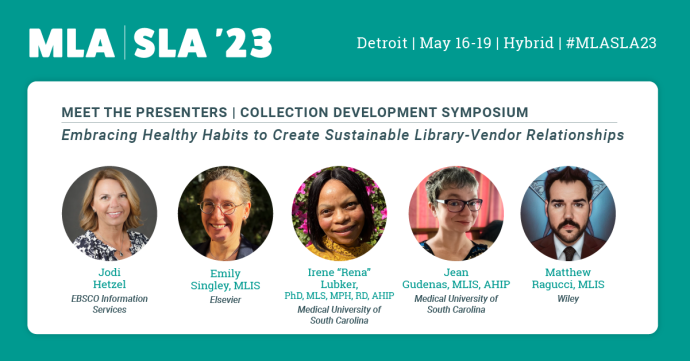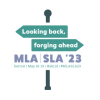Every week until MLA | SLA '23 in Detroit, we profile the experts leading each of the six Symposium sessions by sharing their answers to questions about themselves and their session. This week, we feature the presenters and moderator of Embracing Healthy Habits to Create Sustainable Library-Vendor Relationships: A Panel Discussion for Librarians, Publishers, & Vendors: Emily Singley (ES), Jean Gudenas (JG), Jodi Hetzel (JH), Matthew Ragucci (MR), and Rena Lubker (RL). Join them for their session on Thursday, May 18, 2023, 1:30 p.m. - 3:00 p.m., local time in Detroit. To learn about all the Symposium sessions and their presenters, please see the Symposium Session Schedule.
Please note, these sessions do not award CE credit.
What are you most looking forward to seeing/eating/experiencing in Detroit?
ES: This is my first trip to Detroit, and I can’t wait to learn and explore the city!
JG: I have never been to Detroit and, honestly, I haven’t been outside of South Carolina in a while, so I am looking forward to experiencing my first new city in three years! But one thing that I know is universal: You can always find good food if you know good people, and I’ll be seeing some great people!
JH: I haven’t been to Detroit in quite a few years and look forward to the new energy and revitalization happening around the city.
MR: Seeing a baseball game in every stadium is on my bucket list. This is my very first trip to Detroit, and, as luck would have it, the Tigers are in town. I’ll be arriving a little early to take in a game at Comerica Park. I’m also curious to try the Detroit Coney Dog and pizza to see how they compare with the New York versions.
RL: Seeing all my friends from other states and countries and seeing the Motown Museum and taking the “Detroit’s Spirit and History” tour.
What’s a fun or surprising fact about librarian-vendor/librarian-publisher relationships?
ES: I’m very new to the publisher side (I was a librarian until 6 months ago) and have been surprised by just how much publishers rely on input from librarians and are eager to hear from them.
JG: Early in my career, I saw an “us vs. them” mentality and started seeing Librarians as being from the Good side of the Force and Vendors being part the Dark side. Very quickly, I learned that there is no Good/Dark, but a balance. Finding a balance may not sound like a fun fact, but it came as a surprise to me!
JH: Some of my longest relationships are with librarians! I have known many of my customers for almost 20 years.
MR: We actually do get along and don’t fight like cats and dogs all the time. Something I really enjoy about my role is that I get to have genuine relationships with librarians where we talk about non-work matters, like our favorite films, music, and hobbies. It isn’t always about contract negotiations.
RL: We respect and like each other!
For librarians: What’s an interesting fact about libraries that publishers would be surprised by?
JG: Every library secretly views itself as a version of The Office or Game of Thrones.
RL: We feel awkward explaining to students what “limited concurrent users” means!
For publishers/vendors: What’s an interesting fact about libraries that publishers would be surprised by?
MR: One of the assumptions that I had before working in publishing was that publishers had infinite resources to do everything, and they don’t do things because they are just reluctant to do them. I quickly learned this is not the case. Publishers can and should listen to libraries and make improvements where they can. But it’s important to understand that while publishers can do anything, they can’t do everything. Changes to products, policies, and services take time and effort and need to be strategic.
ES: Organizationally, we are much more similar to libraries than you might think! For example, just like in libraries, we work very collaboratively, and there is less organizational hierarchy than I expected.
JH: How much we fight for them internally to make sure we are offering the best options for them, especially during difficult years.
How did you get started in libraries or publishing?
ES: I started in libraries because I wanted to help academic learners, teachers, and researchers have better access to scholarly content. I recently moved to publishing and am pleased to be able to bring a librarian perspective to my work.
JG: In college, I worked days at the local NPR station and nights in interlibrary loan at the campus library. After graduation, I worked at an osteopathic medical university, which helped fund my graduate degree in informational science. Starting off in health sciences made me want to continue in the field.
JH: Completely by accident. A friend I had once worked with landed a job at Ovid. She talked me into applying and talked the boss into hiring me so we could work together again. Long story short: We both still work together, but at EBSCO!
MR: I started in libraries shortly after I completed my undergraduate degree. With dual Liberal Arts majors and minors, I thought I wanted to be Indiana Jones. It turns out I had no place to use my degree outside of teaching. On a whim, I applied for a job at my public library but didn’t get it. The more I thought about it, the more I felt the library was a natural place for me. Before I knew it, I was taking my GREs and working towards my MLIS. I had been in libraries for 8 years and thought a shift to the private world of publishing would be a good fit and exciting. It was a bumpy transition, but I’m happy I made it. And, I still have the pleasure of working with libraries almost every day.
RL: A librarian colleague and friend encouraged me to go to library school. Before then, I had only seen one other black librarian, and I wanted to become a librarian so that I could encourage other people of color to become librarians.
What’s the most rewarding part of working with librarians or publishers?
ES: Working with librarians keeps me closely connected to our users. The most rewarding part is being able to partner with librarians to improve the experience for everyone who uses our platform and services.
JG: Collaboration. I absolutely love combining forces and seeing what occurs. For collection development, it can be working with colleagues with similar data to spot trends, working with vendors on a deal that can benefit a multitude of users, or trying an innovative deal with a publisher. I have had the pleasure of experiencing all three, and it would not have been possible without collaboration.
JH: I love it when we come up with a way to solve a problem that improves patient or provider care. Librarians aren’t seen on the front lines, but clinicians ask them for help when they don’t know what to do next or what is safe to do. Librarians help the helpers.
MR: I am grateful my role allows me the opportunity to advocate for libraries. Being able to demonstrate that, rather than acting unilaterally, we consult with libraries to make positive change is an incredibly rewarding experience. These changes can be something small, like a metadata correction or creating a resource, or something more complex, like creating a new feature on the product roadmap. Transforming customer feedback into action is not only the best part of working with libraries but also the best part of my job.
RL: Just how available vendors/publishers are when providing training on their products and troubleshooting problems.
What’s the main thing you hope participants will take away from your contribution to the session?
ES: That publishers and libraries can both benefit from working together.
JG: Each Library is unique, but there are universal themes. Whether you are a subject librarian or work with the library budget, your interaction with the vendor is incredibly important.
JH: I hope they will have their imaginations sparked on ways to work together beyond a transactional relationship. I hope we are able to share broader themes with each other.
MR: The relationship between libraries and publishers/vendors does not need to be adversarial. In fact, it should be a collaborative partnership. The things they have in common vastly outnumber their differences. While there may be some disagreement on the means, we largely want the same thing. We all want to help produce and preserve knowledge and provide easy access to research. In a greater sense, we want to enable discovery and empower education to make the world a better place. Those are values we can all get behind.
RL: I want people to appreciate and understand that librarian/vendor relationships have changed in a positive way.
We hope to see you in Detroit! Remember, only select sessions will be live streamed and these sessions do not earn you CE credit. Don't forget to also register for in-person CE Opportunities. If you've already registered for the meeting, open the Registration Form and click "Already Registered."



